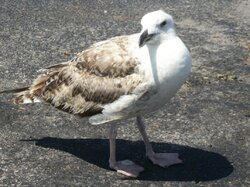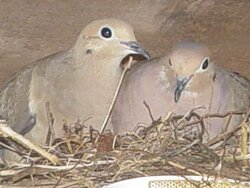Hello
Pic 1
When I was at the cape this weekend, I drive into the white & gray McDonald's in Yarmouth on RT 28 and parked next to the Seagull in the next parking spot and he did not even move!
Pic 2
In the Gazebo at the Hotel I stayed out back next to the pool above the speaker was a Doves nest.
See Mother left and baby on right!
Pic 1
When I was at the cape this weekend, I drive into the white & gray McDonald's in Yarmouth on RT 28 and parked next to the Seagull in the next parking spot and he did not even move!
Pic 2
In the Gazebo at the Hotel I stayed out back next to the pool above the speaker was a Doves nest.
See Mother left and baby on right!



